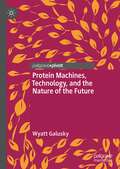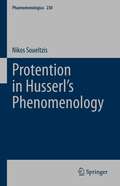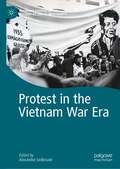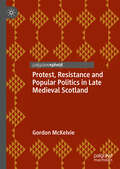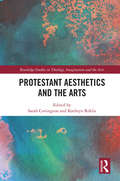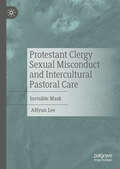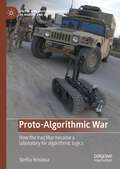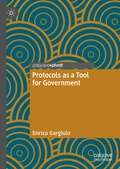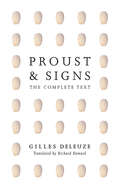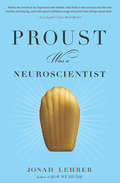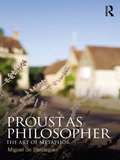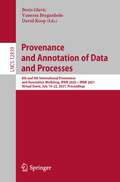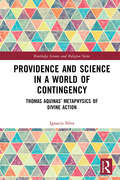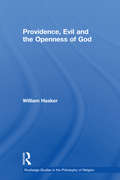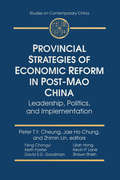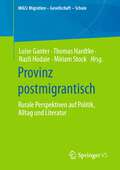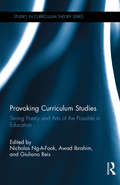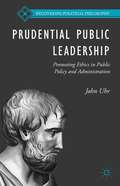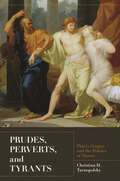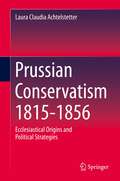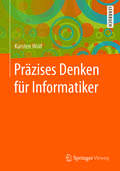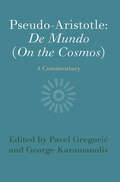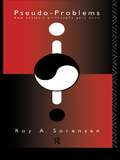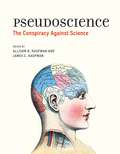- Table View
- List View
Protein Machines, Technology, and the Nature of the Future
by Wyatt GaluskyThis book explores the relationships between humans, chickens, and environments in the context of protein production. The history of these relationships reveals them to be increasingly technological, which results in humans becoming more responsible for those animals and their environments. Understanding this development through the configuration of various kinds of protein machines is key to confronting the kinds of future we wish to promote, and the characteristics of the present we wish to sustain. The book is organized around narratives that explore the concept of the protein machine, with a particular focus on the development of the chicken as it has moved from the field to the factory to the laboratory. These transformations are interconnected, and culminate in efforts to cultivate meat without the animal. Our ultimate goal will be to ask what kind of future does this technology envision, and what roles do humans and animals play in it?
Protention in Husserl’s Phenomenology (Phaenomenologica #230)
by Nikos SoueltzisEvery attempt to examine our consciousness’s passive life and its dynamic in its various forms inevitably intersects with our primal awareness of the future. Even though Husserl’s theory of time-consciousness enjoys a certain fame, his conception of our primordial relation to the future has not been adequately accounted for.The book at hand aims to offer a close study of Husserl’s view of protentional consciousness and to trace its unique contribution to our overall awareness of time. It offers an extensive analysis of various aspects of protention by investigating its connection to different fields and levels of experience. To achieve such a task, the book stresses the need to enrich the familiar formal account of protention with a material one. Thus, alongside issues pertaining exclusively to the form of protention, such as its relation to fulfillment as well as its double-intentional structure, various other dimensions are discussed, such as the phenomena of disappointment and correction as well as the role hyle plays in both of them. In the same vein, special attention is given to the relation between protentional consciousness and affectivity, thus shedding light on the dynamic unity of our living-present.What this study purports to show is that Husserl’s phenomenology is equipped to offer a solid account of the thinnest and subtlest ways in which we are aware of the future in our experiential life.
Protest in the Vietnam War Era (Palgrave Studies in the History of Social Movements)
by Alexander SedlmaierThis book assesses the emergence and transformation of global protest movements during the Vietnam War era. It explores the relationship between protest focused on the war and other emancipatory and revolutionary struggles, moving beyond existing scholarship to examine the myriad interlinked protest issues and mobilisations around the globe during the Indochina Wars. Bringing together scholars working from a range of geographical, historiographical and methodological perspectives, the volume offers a new framework for understanding the history of wartime protest. The chapters are organised around the social movements from the three main geopolitical regions of the world during the 1960s and early 1970s: the core capitalist countries of the so-called first world, the socialist bloc and the Global South. The final section of the book then focuses on international organisations that explicitly sought to bridge and unite solidarity and protest around the world. In an era of persistent military conflict, the book provides timely contributions to the question of what war does to protest movements and what protest movements do to war.
Protest, Resistance and Popular Politics in Late Medieval Scotland
by Gordon McKelvieThis book is the first sustained analysis of popular politics in Scotland during the fourteenth and fifteenth centuries. Despite the long-running historiography on popular protests in both England and continental Europe, there has been little discussion of this phenomenon in Scotland, in part because historians specialising in Scotland have paid little attention to the phenomenon of popular revolt, save an occasional comment in wider studies. There were no large-scale popular uprisings in Scotland, like the Peasants&’ Revolt in England, the Jacquerie in France, or the Ciompi in Florence, but that does not mean that the wider populace was not politically engaged. Indeed, many of the key sources for late medieval Scotland, including The Bruce, Scotichronicon, The Dethe of the Kynge of Scotis and the records of the Scottish parliament, all contain hints of popular political engagement. It is only when these sources are read with a focus on the lower echelons of society that a clearer picture—of a populace with political ideals they sought to uphold—emerges.
Protestant Aesthetics and the Arts (Routledge Studies in Theology, Imagination and the Arts)
by Sarah Covington Kathryn ReklisThe Reformation was one of the defining cultural turning points in Western history, even if there is a longstanding stereotype that Protestants did away with art and material culture. Rather than reject art and aestheticism, Protestants developed their own aesthetic values, which Protestant Aesthetics and the Arts addresses as it identifies and explains the link between theological aesthetics and the arts within a Protestant framework across five-hundred years of history. Featuring essays from an international gathering of leading experts working across a diverse set of disciplines, Protestant Aesthetics and the Arts is the first study of its kind, containing essays that address Protestantism and the fine arts (visual art, music, literature, and architecture), and historical and contemporary Protestant theological perspectives on the subject of beauty and imagination. Contributors challenge accepted preconceptions relating to the boundaries of theological aesthetics and religiously determined art; disrupt traditional understandings of periodization and disciplinarity; and seek to open rich avenues for new fields of research. Building on renewed interest in Protestantism in the study of religion and modernity and the return to aesthetics in Christian theological inquiry, this volume will be of significant interest to scholars of Theology, Aesthetics, Art and Architectural History, Literary Criticism, and Religious History.
Protestant Clergy Sexual Misconduct and Intercultural Pastoral Care: Invisible Mask
by AHyun LeeThis volume examines the often-overlooked crisis of sexual misconduct within Korean Protestant churches, exploring how militarized culture, hierarchical power, and institutional silence contribute to the abuse of congregants—especially those in vulnerable situations. Through a blend of sociocultural, theological, and psychological analysis, the book goes beyond individual acts of transgression to reveal the systemic forces that perpetuate clergy sexual misconduct. By investigating the historical, cultural, and spiritual dimensions of abuse, the book offers a framework for reframing survivor-centered care and rethinking pastoral theology. It concludes with a call for transformative change in religious practice, urging greater transparency and more compassionate faith communities. Essential reading for scholars, students, and practitioners, this book provides critical insights into addressing sexual abuse within church settings and fostering ethical ministry.
Proto-Algorithmic War: How the Iraq War became a laboratory for algorithmic logics (Social and Cultural Studies of Robots and AI)
by Stefka HristovaDuring the Iraq War, American soldiers were sent to both fight an enemy and to recover a “failed state” in pixelated camouflage uniforms, accompanied by robots, and armed with satellite maps and biometric hand-held scanners. The Iraq War, however, was no digital game: massive-scale physical death and destruction counter the vision of a clean replayable war. The military policy of the United States, and not the actual experience of war, has been rooted in the logic of digital, and nascent algorithmic technology. This logic attempted to reduce culture, society, as well as the physical body and environment into visual data that lacks cultural and historical context. This book details the emergence of a nascent algorithmic war culture in the context of the Iraq War (2003-2010) in relation to the data-driven early 20th century British Mandate for Iraq. Through a series of five inquiries into the ways in which the Iraq War attempted to and often failed to see population and territory as digital and further proto-algorithmic entities, it offers an insight into the digitization and further unmanned automaton of war. It does so through a comparative historical framework reaching back to the quantification techniques harnessed during the British Mandate for Iraq (1918-1932) in order to explicate the parallels and complicated the diversions between the numerical logics that have driven both military state-building enterprises.
Protocols as a Tool for Government
by Enrico GargiuloThis book provides a genealogy of the concept of ‘protocol’ in government. It examines the functions that different protocols play in the contemporary world, and how they act as devices which regulate delicate and strategic fields of politics and society. The book opens by assessing the historical origins of the word ‘protocol’, proposes a typology of protocols, and highlights the three main actions of these devices: formalising, standardising, and certifying. It then stresses the ways in which protocols are employed as governing devices, their use as policy instruments, and their role within capitalism. The book concludes by analysing protocol as a method for managing various aspects of social life. The politics of protocols and the dilemmas they present, especially within crisis and emergency scenarios, are also discussed. The book will appeal to scholars and students of public policy, sociology, political philosophy and the theory of law.
Protyposis – eine Einführung: Bewusstsein und Materie aus Quanteninformation (essentials)
by Thomas GörnitzDas vorliegende essential stellt die Protyposis als abstrakte bedeutungsoffene Qubits (AQIs) vor. Dies sind die physikalisch und mathematisch einfachsten Quantenstrukturen. Deren fundamentale Rolle begründet eine durchgängige Erklärung der kosmischen Entwicklung, der Herausformung materieller Teilchen, von Leben und Bewusstsein. Aus ihr folgen Strukturen der Wechselwirkungen, der gravitativen, elektromagnetischen, schwachen und starken. In einem Lebewesen werden AQIs für dieses auch zu bedeutungsvoller Information. Die AQIs formen Körper und Psyche als „Uniware“ zu einer Einheit, die ein hochentwickeltes Bewusstsein zu freien Entscheidungen befähigt. Es agiert sowohl logisch als auch spontan, im Gegensatz zur KI sogar nicht-algorithmisch.
Proust And Signs: The Complete Text (Theory Out of Bounds #17)
by Gilles DeleuzeIn a remarkable instance of literary and philosophical interpretation, the incomparable Gilles Deleuze reads Marcel Proust&’s work as a narrative of an apprenticeship—more precisely, the apprenticeship of a man of letters. Considering the search to be one directed by an experience of signs, in which the protagonist learns to interpret and decode the kinds and types of symbols that surround him, Deleuze conducts us on a corollary search—one that leads to a new understanding of the signs that constitute A la recherche du temps perdu. In Richard Howard&’s graceful translation, augmented with an essay that Deleuze added to a later French edition, Proust and Signs is the complete English version of this work. Admired as an imaginative and innovative study of Proust and as one of Deleuze&’s more accessible works, Proust and Signs stands as the writer&’s most sustained attempt to understand and explain the work of art.
Proust Was a Neuroscientist
by Jonah LehrerThe New York Times–bestselling author provides an &“entertaining&” look at how artists enlighten us about the workings of the brain (New York magazine). In this book, the author of How We Decide and Imagine: How Creativity Works &“writes skillfully and coherently about both art and science&”—and about the connections between the two (Entertainment Weekly). In this technology-driven age, it&’s tempting to believe that science can solve every mystery. After all, it&’s cured countless diseases and sent humans into space. But as Jonah Lehrer explains, science is not the only path to knowledge. In fact, when it comes to understanding the brain, art got there first. Taking a group of artists—a painter, a poet, a chef, a composer, and a handful of novelists—Lehrer shows how each one discovered an essential truth about the mind that science is only now rediscovering. We learn, for example, how Proust first revealed the fallibility of memory; how George Eliot discovered the brain&’s malleability; how the French chef Escoffier discovered umami (the fifth taste); how Cézanne worked out the subtleties of vision; and how Gertrude Stein exposed the deep structure of language—a full half-century before the work of Noam Chomsky and other linguists. More broadly, Lehrer shows that there&’s a cost to reducing everything to atoms and acronyms and genes. Measurement is not the same as understanding, and art knows this better than science does. An ingenious blend of biography, criticism, and first-rate science writing, Proust Was a Neuroscientist urges science and art to listen more closely to each other, for willing minds can combine the best of both to brilliant effect. &“His book marks the arrival of an important new thinker . . . Wise and fresh.&” —Los Angeles Times
Proust as Philosopher: The Art of Metaphor
by Miguel de BeisteguiMarcel Proust’s In Search of Lost Time has long fascinated philosophers for its complex accounts of time, personal identity and narrative, amongst many other themes. Proust as Philosopher: The Art of Metaphor is the first book to try and connect Proust’s implicit ontology of experience with the question of style, and of metaphor in particular. Miguel de Beistegui begins with an observation: throughout In Search of Lost Time, the two main characters seem prone to chronic dissatisfaction in matters of love, friendship and even art. Reality always falls short of expectation. At the same time, the narrator experiences unexpected bouts of intense elation, the cause and meaning of which remain elusive. Beistegui argues we should understand these experiences as acts of artistic creation, and that this is why Proust himself wrote that true life is the life of art. He goes on to explore the nature of these joyful and pleasurable experiences and the transformation required of art, and particularly literature, if it is to incorporate them. He concludes that Proust revolutionises the idea of metaphor, extending beyond the confines of language to understand the nature of lived, bodily experience.
Provenance and Annotation of Data and Processes: 8th and 9th International Provenance and Annotation Workshop, IPAW 2020 + IPAW 2021, Virtual Event, July 19–22, 2021, Proceedings (Lecture Notes in Computer Science #12839)
by Boris Glavic Vanessa Braganholo David KoopThis book constitutes the proceedings of the 8th and 9th International Provenance and Annotation Workshop, IPAW 2020 and IPAW 2021 which were held as part of ProvenanceWeek in 2020 and 2021. Due to the COVID-19 pandemic, PropvenanceWeek 2020 was held as a 1-day virtual event with brief teaser talks on June 22, 2020. In 2021, the conference was held virtually during July 19-22, 2021. The 11 full papers and 12 posters and system demonstrations included in these proceedings were carefully reviewed and selected from a total of 31 submissions. They were organized in the following topical sections: provenance capture and representation; security; provenance types, inference, queries and summarization; reliability and trustworthiness; joint IPAW/TaPP poster and demonstration session.
Providence and Science in a World of Contingency: Thomas Aquinas’ Metaphysics of Divine Action (Routledge Science and Religion Series)
by Ignacio SilvaProvidence and Science in a World of Contingency offers a novel assessment of the contemporary debate over divine providential action and the natural sciences, suggesting a re-consideration of Thomas Aquinas’ metaphysical doctrine of providence coupled with his account of natural contingency. By looking at the history of debates over providence and nature, the volume provides a set of criteria to evaluate providential divine action models, challenging the underlying, theologically contentious assumptions of current discussions on divine providential action. Such assumptions include that God needs causally open spaces in the created world in order to act in it providentially, and the unfitting conclusion that, if this is the case, then God is assumed to act as another cause among causes. In response to these shortcomings, the book presents a comprehensive account of Aquinas’ metaphysics of natural causation, contingency, and their relation to divine providence. It offers a fresh and bold metaphysical narrative, based on the thought of Thomas Aquinas, which appreciates the relation between divine providence and natural contingency.
Providence, Evil and the Openness of God (Routledge Studies in the Philosophy of Religion)
by William HaskerProvidence, Evil and the Openness of God is a timely exploration of the philosophical implications of the rapidly-growing theological movement known as open theism, or the 'openness of God'. William Hasker, one of the philosophers prominently associated with this movement, presents the strengths of this position in comparison with its main competitors: Calvinism, process theism, and the theory of divine middle knowledge, or Molinism.The author develops alternative approaches to the problem of evil and to the problem of divine action in the world. In particular, he argues that believers should not maintain the view that each and every evil that occurs is permitted by God as a means to a 'greater good'. He contends that open theism makes possible an emphasis on the personalism of divine-human interaction in a way that traditional views, with their heavy emphasis on divine control, cannot easily match. The book concludes with a section of replies to critics, in which many of the objections levelled against open theism are addressed.
Provincial Strategies of Economic Reform in Post-Mao China: Leadership, Politics, and Implementation (Studies On Contemporary China)
by Zhimin Lin Jae Ho Chung Peter T.Y. CheungFocusing on the role of provincial leadership in the initiation and implementation of economic reform, this text studies economic decentralization in eight Chinese provinces. In each area, resource allocation and acquisition of foreign capital and investment are investigated.
Provinz postmigrantisch: Rurale Perspektiven auf Politik, Alltag und Literatur (MiGS: Migration - Gesellschaft - Schule)
by Miriam Stock Nazli Hodaie Luise Ganter Thomas HardtkeDer Band entwickelt eine postmigrantische Perspektive auf provinzielle oder provinzbezogene Kontexte und Positionierungen und vereinigt dabei literarische Perspektiven mit empirischen Zugängen zu Politik und Alltag. Es werden postmigrantische Aushandlungen in ruralen Kontexten in den Blick genommen und zudem gefragt, wie sich Vorstellungen zur „Provinz“ wie auch zur „Migration“ gegenseitig bedingen, neuformieren und wo dies konkret geschieht.
Provoking Curriculum Studies: Strong Poetry and Arts of the Possible in Education (Studies in Curriculum Theory Series)
by Nicholas Ng-A-Fook, Awad Ibrahim and Giuliano ReisProvoking Curriculum Studies pushes forward a strong reading of the theoretical and methodological innovations taking place within curriculum studies research. Addressing an important gap in contemporary curriculum studies—conceptualizing scholars as poets and the potential of the poetic in education—it offers a framework for doing curriculum work at the intersection of the arts, social theory, and curriculum studies. Drawing on poetic inquiry, psychoanalysis, phenomenology, life writing, and several types of arts-based research methodologies, this diverse collection spotlights the intellectual genealogies of curriculum scholars such as Ted Aoki, Geoffrey Milburn and Roger Simon, whose provocations, inquiries, and recursive questioning link the writing and re-writing of curriculum theory to acts of strong poetry. Readers are urged to imagine alternative ways in which professors, teachers, and university students might not only engage with but disrupt, blur, and complicate curriculum theory across interdisciplinary topographies in order to seek out blind impresses—those areas of knowledge that are left over, unaddressed by ‘mainstream’ curriculum scholarship, and that instigate difficult questions about death, trauma, prejudice, poverty, colonization, and more.
Prudential Public Leadership
by John UhrDemocratic systems of public administration draw on various schools of political leadership to promote administrative ethics and public responsibility. Contemporary public administrators justify their public leadership through a blend of ethics around pragmatism (Mill's utilitarianism), principle (Kant's deontology or duty-based ethics) and prudence (Aristotle's ethical and political theory). Prudential Public Leadership brings Aristotle back into the front rank of studies of administrative leadership, based in part on the now-neglected reliance on Aristotle by the innovators who shaped the system of democratic public administration in the late nineteenth century.
Prudes, Perverts, and Tyrants: Plato's Gorgias and the Politics of Shame
by Christina H. TarnopolskyIn recent years, most political theorists have agreed that shame shouldn't play any role in democratic politics because it threatens the mutual respect necessary for participation and deliberation. But Christina Tarnopolsky argues that not every kind of shame hurts democracy. In fact, she makes a powerful case that there is a form of shame essential to any critical, moderate, and self-reflexive democratic practice. Through a careful study of Plato's Gorgias, Tarnopolsky shows that contemporary conceptions of shame are far too narrow. For Plato, three kinds of shame and shaming practices were possible in democracies, and only one of these is similar to the form condemned by contemporary thinkers. Following Plato, Tarnopolsky develops an account of a different kind of shame, which she calls "respectful shame." This practice involves the painful but beneficial shaming of one's fellow citizens as part of the ongoing process of collective deliberation. And, as Tarnopolsky argues, this type of shame is just as important to contemporary democracy as it was to its ancient form. Tarnopolsky also challenges the view that the Gorgias inaugurates the problematic oppositions between emotion and reason, and rhetoric and philosophy. Instead, she shows that, for Plato, rationality and emotion belong together, and she argues that political science and democratic theory are impoverished when they relegate the study of emotions such as shame to other disciplines.
Prussian Conservatism 1815-1856: Ecclesiastical Origins and Political Strategies
by Laura Claudia AchtelstetterThe book examines the nexus between political and religious thought within the Prussian old conservative milieu. It presents early-nineteenth-century Prussian conservatism as a phenomenon connected to a specific generation of young Prussians. The book introduces the ecclesial-political ‘party of the Evangelische Kirchenzeitung’ (EKZ), a religious party within the Prussian state church, as the origins of Prussia’s conservative party post-1848. It traces the roots of the EKZ party back to the experiences of the Napoleonic Wars (1806-15) and the social movements dominant at that time. Additionally, the book analyses this generation’s increasing politicization and presents the German revolution of 1848 and the foundation of Prussia’s first conservative party as the result of a decade-long struggle for a religiously-motivated ideal of church, state, and society. The overall shift from church politics to state politics is key to understanding conservative policy post-1848. Consequently, this book shows how conservatives aimed to maintain Prussia’s character as a Christian and monarchical state, while at the same time adapting to contemporary political and social circumstances. Therefore, the book is a must-read for researchers, scholars, and students of Political Science and History interested in a better understanding of the origins and the evolution of Prussian conservatism, as well as the history of political thought.
Präzises Denken für Informatiker
by Karsten WolfDas Lehrbuch befasst sich mit dem präzisen Denken, einer Schlüsselkompetenz im Studium der Informatik. Es bildet die Vorstufe für das Verständnis der logischen Grundfunktionen der Informatik. Das Erlernen der mathematischen Logik ist ein wesentlicher Bestandteil des Grundstudiums, da das logische Denken in der Informatik auf den gleichen Regeln und Techniken basiert wie in der Mathematik. Der Autor führt umfassend in die Aussagenlogik ein und erklärt unter anderem die Bedeutungen von logischer Äquivalenz, Implikation und Induktion für diesen Fachbereich. Darüber hinaus definiert er den Beweis aus Sicht der Mathematik und stellt grundlegende Beweisstrategien vor, die im Studium benötigt werden. Mit den in diesem Lehrbuch vorgestellten Techniken des präzisen Denkens erwerben die Studenten die Fähigkeit, Begriffe punktgenau zu definieren, Aussagen trennscharf zu formulieren und ihre Richtigkeit angemessen zu begründen. Viele praxisnahe Aufgaben und Lösungshinweise innerhalb der Kapitel erleichtern die Überprüfung und Vertiefung des Lernstoffs. Der Autor richtet sich vornehmlich an Bachelorstudenten der ersten Semester. Sie finden in diesem Werk eine optimale Vorbereitung auf die Logik-Seminare ihres Informatikstudiums. Die vermittelten Kompetenzen verbessern dabei nicht nur das Verständnis im Informatik-Studium, sondern sind ebenso für das spätere Berufsleben von großer Bedeutung. Darüber hinaus erhalten auch interessierte Laien mit diesem Buch einen interessanten Einblick in die Welt der Informatik und Mathematik und lernen, dass die Fähigkeit zu präzisem Denken auch jenseits dieser Fachbereiche hilfreich sein kann.
Pseudo-Aristotle (On the Cosmos): A Commentary
by George Karamanolis Pavel GregorićDe mundo is a protreptic to philosophy in the form of a letter to Alexander the Great and is traditionally ascribed to Aristotle. It offers a unique view of the cosmos, God and their relationship, which was inspired by Aristotle but written by a later author. The author provides an outline of cosmology, geography and meteorology, only to argue that a full understanding of the cosmos cannot be achieved without a proper grasp of God as its ultimate cause. To ensure such a grasp, the author provides a series of twelve carefully chosen interlocking analogies, building a complex picture in the reader's mind. The work develops a distinctly Aristotelian picture of God and the cosmos while paying tribute to pre-Aristotelian philosophers and avoiding open criticism of rival schools of philosophy. De mundo exercised considerable influence in late antiquity and then in the Renaissance and Early Modern times.
Pseudo-Problems: How Analytic Philosophy Gets Done
by Roy A. SorensenFirst published in 1993. Routledge is an imprint of Taylor & Francis, an informa company.
Pseudoscience - The Conspiracy Against Science
by James Kaufman Allison Kaufman David Hecht Emilio Lobato Corrine ZimmermanIn a post-truth, fake news world, we are particularly susceptible to the claims of pseudoscience. When emotions and opinions are more widely disseminated than scientific findings, and self-proclaimed experts get their expertise from Google, how can the average person distinguish real science from fake? This book examines pseudoscience from a variety of perspectives, through case studies, analysis, and personal accounts that show how to recognize pseudoscience, why it is so widely accepted, and how to advocate for real science. Contributors examine the basics of pseudoscience, including issues of cognitive bias; the costs of pseudoscience, with accounts of naturopathy and logical fallacies in the anti-vaccination movement; perceptions of scientific soundness; the mainstream presence of “integrative medicine,” hypnosis, and parapsychology; and the use of case studies and new media in science advocacy.
